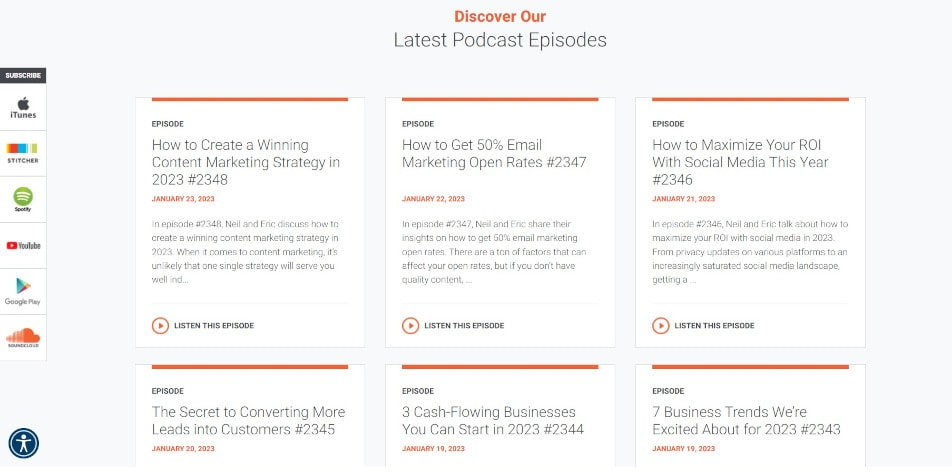Podcasts are growing in popularity every day. They offer a unique way to connect with audiences.
But how can you ensure your podcast stands out? A solid content marketing strategy is key. This means planning and promoting your podcast effectively. It’s not just about recording and uploading episodes. It’s about creating a plan that attracts listeners and keeps them coming back.
This blog will guide you through steps to develop a winning content marketing strategy for your podcast. We will explore tips and techniques to boost your podcast’s reach. Get ready to learn how to make your podcast a must-listen in its niche. Let’s dive in!
Introduction To Podcast Content Marketing
Podcast content marketing is a powerful tool for reaching a wider audience. It involves creating and sharing podcast episodes that offer value to listeners. This strategy helps in building a loyal audience and enhancing brand awareness. Podcasts are becoming increasingly popular, making it an ideal platform for content marketing.
Importance Of Content Marketing
Content marketing is crucial for podcasts for several reasons:
- Engagement: High-quality content keeps your audience engaged.
- Trust: Valuable content builds trust with your listeners.
- Brand Awareness: Consistent content increases your brand’s visibility.
Without content marketing, your podcast may struggle to reach its potential. Content marketing ensures that your podcast is not just heard but also valued by its audience.
Benefits For Podcasts
There are many benefits to using content marketing for podcasts:
- Audience Growth: Quality content attracts more listeners.
- Monetization: A larger audience can lead to monetization opportunities.
- SEO Benefits: Podcasts can improve your website’s SEO.
Content marketing can transform your podcast into a successful platform. It helps in creating a strong connection with your audience and opens up new opportunities for growth and revenue.
| Benefit | Description |
|---|---|
| Audience Growth | Attracts more listeners with valuable content |
| Monetization | Increases opportunities for revenue |
| SEO Benefits | Enhances website’s search engine ranking |
In conclusion, a well-planned content marketing strategy is essential for the success of any podcast. It not only helps in growing your audience but also provides numerous other benefits that contribute to the overall growth of your brand.
Identifying Your Target Audience
Understanding your audience is crucial for a successful podcast. Knowing who listens helps you create content that resonates. This engagement increases listener loyalty and expands your reach.
Analyzing Listener Demographics
Start by analyzing listener demographics. Gather data on age, gender, location, and interests. Use tools like Spotify for Podcasters and Apple Podcasts Analytics. These tools provide valuable insights.
Consider the following metrics:
- Age groups: Identify which age groups listen the most.
- Gender: Understand the gender distribution of your audience.
- Location: Know where your listeners are from.
- Interests: Align content with their interests.
This data helps tailor your content to meet their needs.
Creating Listener Personas
Creating listener personas is another step in identifying your target audience. A persona is a fictional character that represents a segment of your audience.
Here is a simple table to create a listener persona:
| Attribute | Details |
|---|---|
| Name | John Doe |
| Age | 28 |
| Gender | Male |
| Location | New York, USA |
| Interests | Technology, Business, Self-Improvement |
| Listening Habits | Listens during morning commute |
Use this persona to guide your content creation. Focus on topics that interest your persona. Address their pain points and preferences.
Identifying your target audience involves analyzing demographics and creating listener personas. This ensures your content is relevant and engaging.
Setting Clear Goals
Setting clear goals is essential for a successful podcast content marketing strategy. It helps you stay focused and measure success. When you know what you want to achieve, you can create content that aligns with your objectives. Let’s dive into how to set clear goals for your podcast.
Defining Success Metrics
To define success metrics, start by identifying what success looks like for your podcast. This could be increased downloads, higher listener engagement, or more social media shares. Use the following table to outline your metrics:
| Goal | Metric | Target |
|---|---|---|
| Increase downloads | Number of downloads | 5,000 per month |
| Higher engagement | Listener comments | 100 comments per episode |
| More social shares | Shares on social media | 200 shares per episode |
By defining these metrics, you can track your progress and adjust your strategy as needed.
Aligning Goals With Business Objectives
Aligning your goals with business objectives ensures your podcast contributes to your overall success. Consider the following points:
- Identify your business objectives.
- Determine how your podcast can support these objectives.
- Set specific goals that align with these objectives.
For example, if your business objective is to increase brand awareness, your podcast goal might be to reach a broader audience. You can achieve this by creating shareable content and promoting it on various platforms.
By aligning your podcast goals with business objectives, you ensure that every episode contributes to your overall success.
%20(1).webp)
Credit: riverside.fm
Crafting Compelling Content
Crafting compelling content for your podcast is crucial for engaging your audience. Listeners want value, entertainment, and information. To meet these needs, focus on creating high-quality content. This involves choosing relevant topics and maintaining consistent quality throughout your episodes.
Choosing Relevant Topics
Identify what your audience cares about. Research trending topics in your niche. Use social media, forums, and surveys to gather ideas. Make sure your topics align with your podcast’s theme. This keeps your content focused and appealing.
Invite guest experts for interviews. Their insights add value and attract new listeners. Share personal stories related to your topic. This makes your content relatable and engaging. Always aim to solve a problem or answer a question. This ensures your content is useful.
Maintaining Consistent Quality
Set a high standard for audio quality. Clear sound keeps listeners engaged. Use good equipment and editing software. Plan your episodes thoroughly. A well-structured episode is easy to follow.
Be consistent with your release schedule. Regular episodes build trust and anticipation. Create a content calendar to stay organized. Write scripts or outlines to stay on track. This avoids rambling and keeps your content focused.
Stay true to your podcast’s voice. Authenticity resonates with listeners. Be passionate about your topics. Enthusiasm is contagious and keeps your audience coming back for more.
Optimizing Seo For Podcasts
Optimizing SEO for podcasts can boost your podcast’s visibility. It helps attract more listeners and improve search rankings. The right strategy can make your podcast more discoverable.
Keyword Research
Keyword research is essential for podcast SEO. Identify keywords related to your podcast’s topic. Use tools like Google Keyword Planner or Ubersuggest. Focus on long-tail keywords. They are less competitive and more specific.
Include keywords in your podcast title and description. This helps search engines understand your content. Listeners searching for these terms will find your podcast more easily.
Optimizing Show Notes And Transcripts
Show notes and transcripts are great for SEO. They provide detailed information about your podcast. Include keywords naturally in show notes. Write a summary of each episode. This helps search engines index your content.
Transcripts are also valuable. They make your content accessible to a wider audience. Search engines can read transcripts. This improves your podcast’s SEO. Use transcription services if needed. Ensure accuracy for best results.
Promoting Your Podcast
Promoting your podcast is crucial for reaching a wider audience. A well-thought-out strategy can help you stand out in a crowded market. Here’s how you can effectively promote your podcast.
Leveraging Social Media
Social media platforms are excellent for podcast promotion. Share engaging snippets from your episodes. Use eye-catching graphics and quotes to draw attention. Post regularly to maintain a presence. Engage with your audience by asking questions and responding to comments. This creates a community around your podcast.
Utilize stories and live videos on platforms like Instagram and Facebook. These features help you connect with followers in real time. Share behind-the-scenes content to make your audience feel involved. Use relevant keywords and hashtags to increase visibility. Cross-promote on different social media accounts to reach more people.
Collaborating With Influencers
Partnering with influencers can boost your podcast’s reach. Identify influencers in your niche. Approach them with a clear collaboration proposal. Offer to feature them on your podcast or ask them to mention your show. Influencers have loyal followers who trust their recommendations. This can bring new listeners to your podcast.
Ensure the collaboration feels natural and benefits both parties. Share the content created through the partnership on your social media and website. This amplifies the reach and impact of the collaboration. Track the results to understand what works best for your audience.
Engaging With Your Audience
Connecting with your audience is vital for a successful podcast. Engaging your listeners can boost loyalty and increase your reach. It creates a community around your content. This section covers strategies to engage your audience effectively.
Encouraging Listener Interaction
Involve your listeners in your podcast. Ask for their opinions and feedback. This makes them feel valued and part of the show.
- Use social media platforms to create polls and questions.
- Encourage listeners to share their thoughts on specific topics.
- Read listener comments and questions during your episodes.
Another way to engage is by creating exclusive content for dedicated listeners. Offer behind-the-scenes content or bonus episodes. This rewards loyal listeners and keeps them engaged.
Hosting Live Sessions And Q&as
Live sessions are a powerful way to interact with your audience in real-time. They create a sense of urgency and excitement.
| Benefit | Description |
|---|---|
| Immediate Feedback | Listeners can ask questions and get answers instantly. |
| Personal Connection | Live sessions make listeners feel more connected to you. |
| Increased Engagement | Real-time interaction keeps listeners more engaged. |
To host a successful live session:
- Announce the session date and time in advance.
- Promote the session on your social media platforms.
- Prepare a list of topics or questions to discuss.
- Encourage listeners to submit questions before the session.
During the live session, make sure to acknowledge listeners’ comments and questions. This shows that you value their input and are interested in their thoughts.
Analyzing Performance Metrics
Understanding the performance of your podcast is crucial for success. Analyzing performance metrics helps you see what works and what doesn’t. It guides your strategy and improves your content. Let’s explore two key areas in analyzing performance metrics.
Tracking Listener Growth
Tracking listener growth shows how your audience changes over time. Monitor the number of downloads and streams for each episode. This reveals trends and patterns in listener behavior. Check the platforms where your podcast is most popular. This helps you focus your efforts where they matter most. Also, pay attention to listener demographics. Knowing who your audience is can help tailor your content to their preferences.
Adjusting Strategies Based On Data
Adjusting your strategies based on data is vital. Analyze which episodes have the highest engagement. Identify common themes or formats in these episodes. Use this information to create similar content in the future. If certain topics perform poorly, consider dropping or tweaking them. Regularly review your metrics to stay updated with listener preferences. This keeps your podcast relevant and engaging.
Monetizing Your Podcast
Monetizing your podcast can be a great way to earn money. You can explore various methods to generate income. Let’s dive into two effective strategies: sponsorship opportunities and subscription models.
Exploring Sponsorship Opportunities
One way to monetize your podcast is through sponsorships. Sponsors pay you to mention their products or services. You can include ads at the beginning, middle, or end of your episodes. It’s important to find sponsors that match your podcast content. This ensures your audience remains engaged. You can reach out to companies directly. Or, use platforms that connect podcasters with sponsors. Make sure to provide value to your sponsors. This can lead to long-term partnerships.
Implementing Subscription Models
Another monetization method is using subscription models. You can offer exclusive content to your subscribers. This can include bonus episodes or ad-free listening. Platforms like Patreon can help you manage subscriptions. Set different subscription tiers with various perks. This can attract more subscribers. Keep your subscribers engaged with regular updates. This ensures they continue to support your podcast. Building a loyal subscriber base can provide steady income.

Credit: brand24.com

Credit: blog.spreaker.com
Frequently Asked Questions
What Is A Content Marketing Strategy For Podcasts?
A content marketing strategy for podcasts involves planning, creating, distributing, and promoting podcast episodes to attract and engage listeners.
How To Create A Podcast Content Strategy?
To create a podcast content strategy, identify your audience, set goals, plan content topics, and schedule regular episodes.
Why Is Content Marketing Important For Podcasts?
Content marketing is important for podcasts to increase visibility, build a loyal audience, and drive engagement with your brand.
How Often Should I Release Podcast Episodes?
Consistency is key. Release podcast episodes weekly or bi-weekly to maintain audience interest and engagement.
Conclusion
Creating a strong content marketing strategy for your podcast is essential. Focus on knowing your audience well. Craft engaging content that resonates with them. Consistency is key in building trust and loyalty. Promote your podcast across various platforms. Utilize social media, email newsletters, and collaborations.
Measure your success with analytics and adjust your strategy as needed. Stay committed, and your podcast will grow over time. With these steps, you can effectively reach and engage your listeners. Happy podcasting!


Leave a Reply